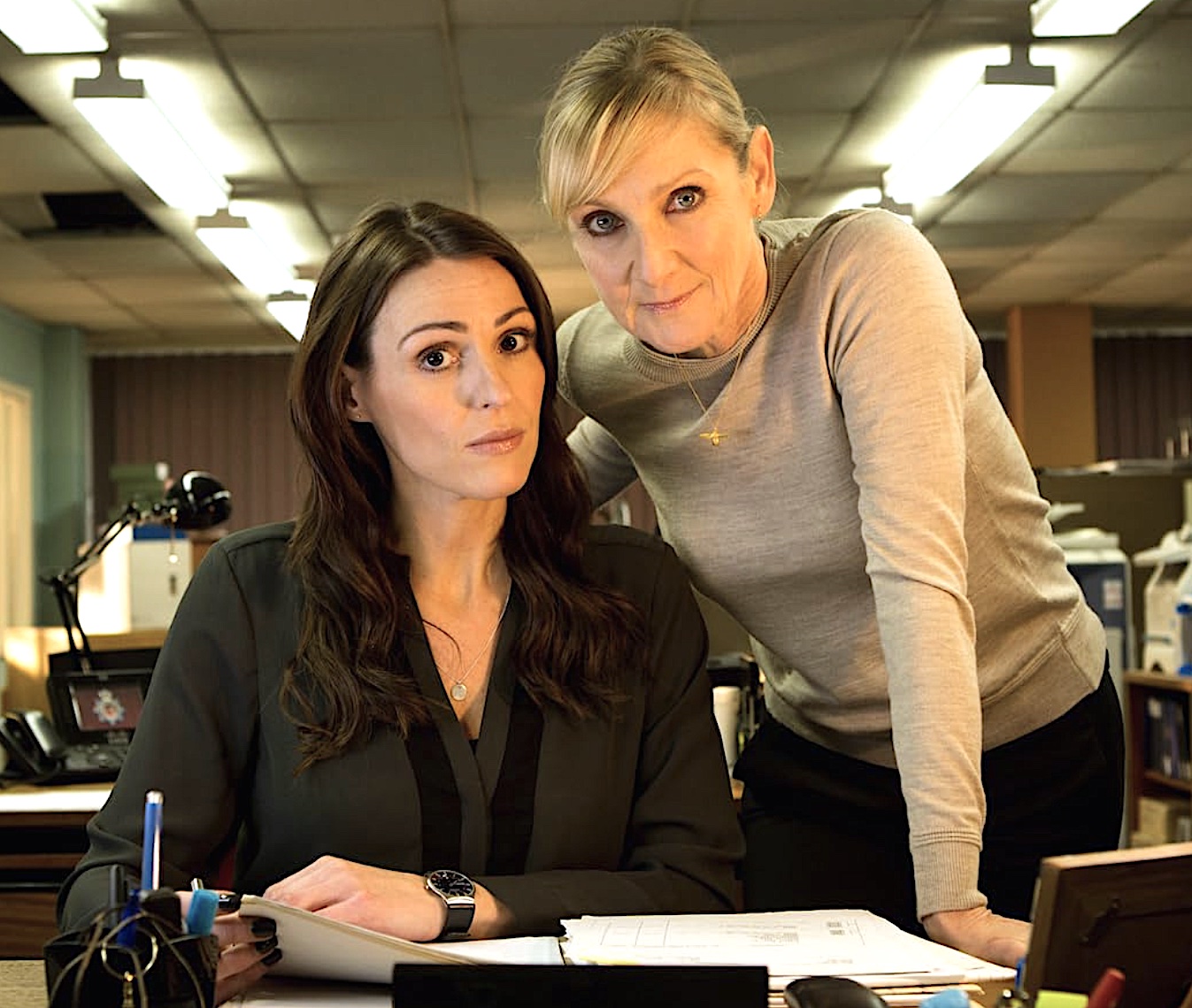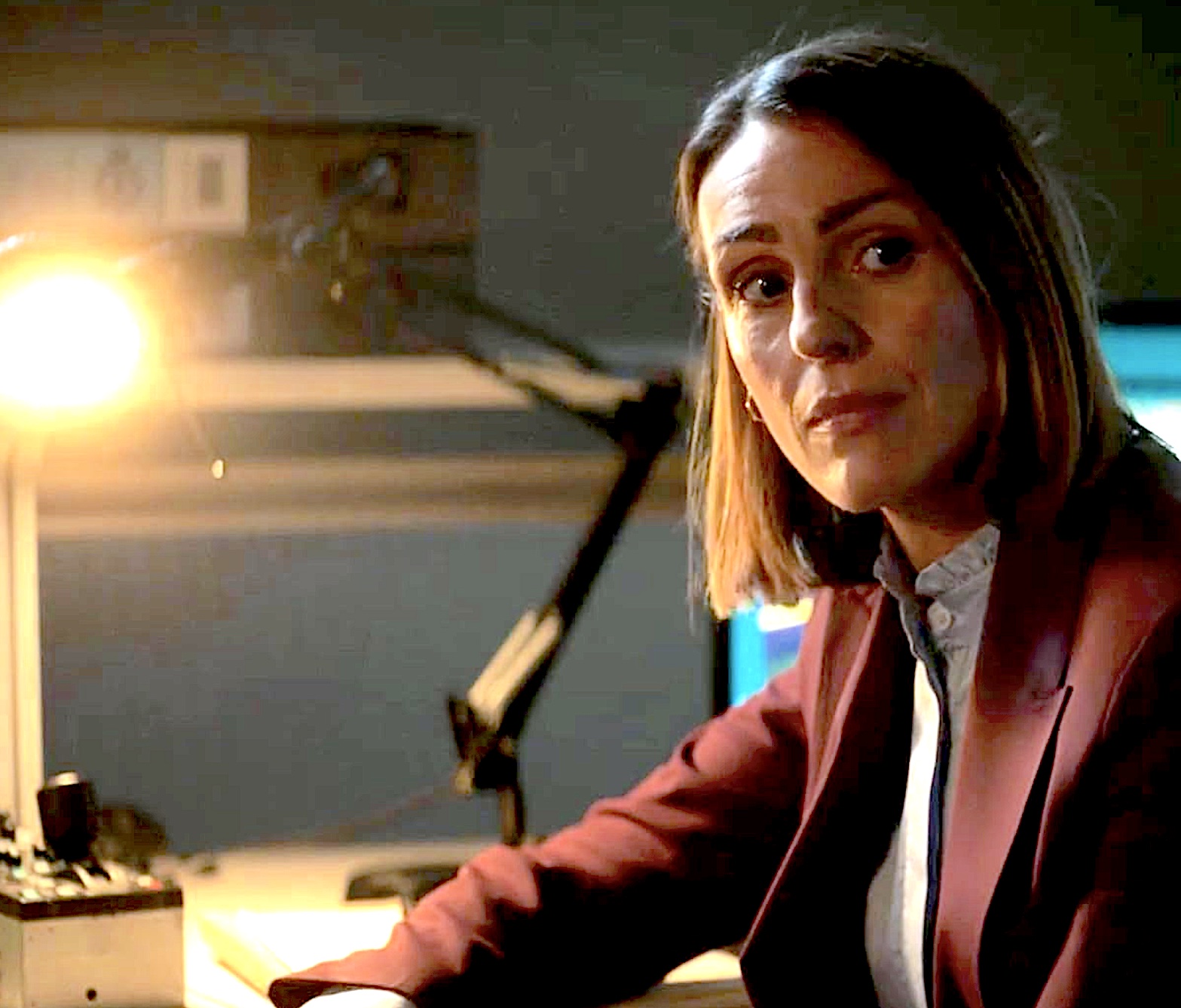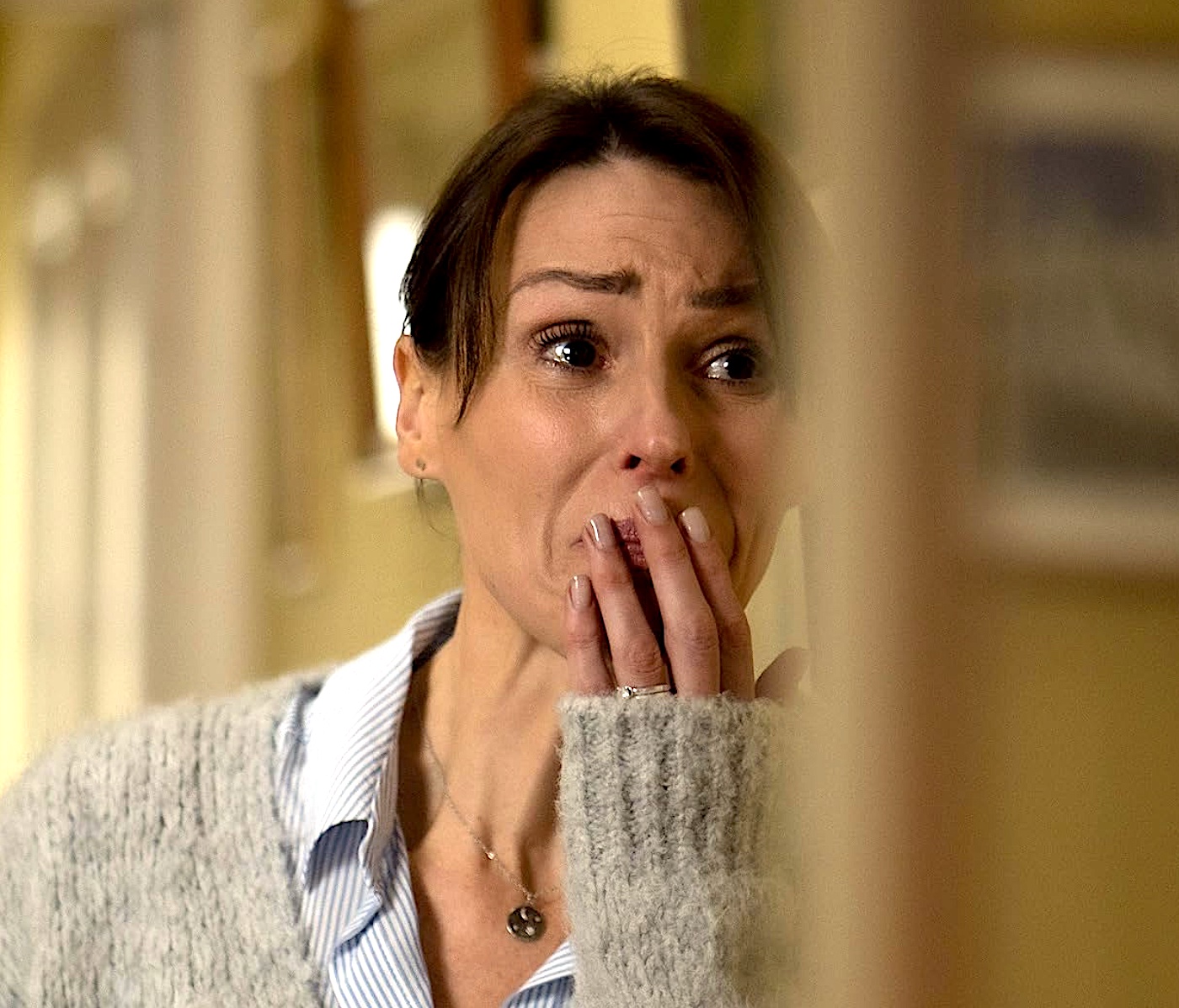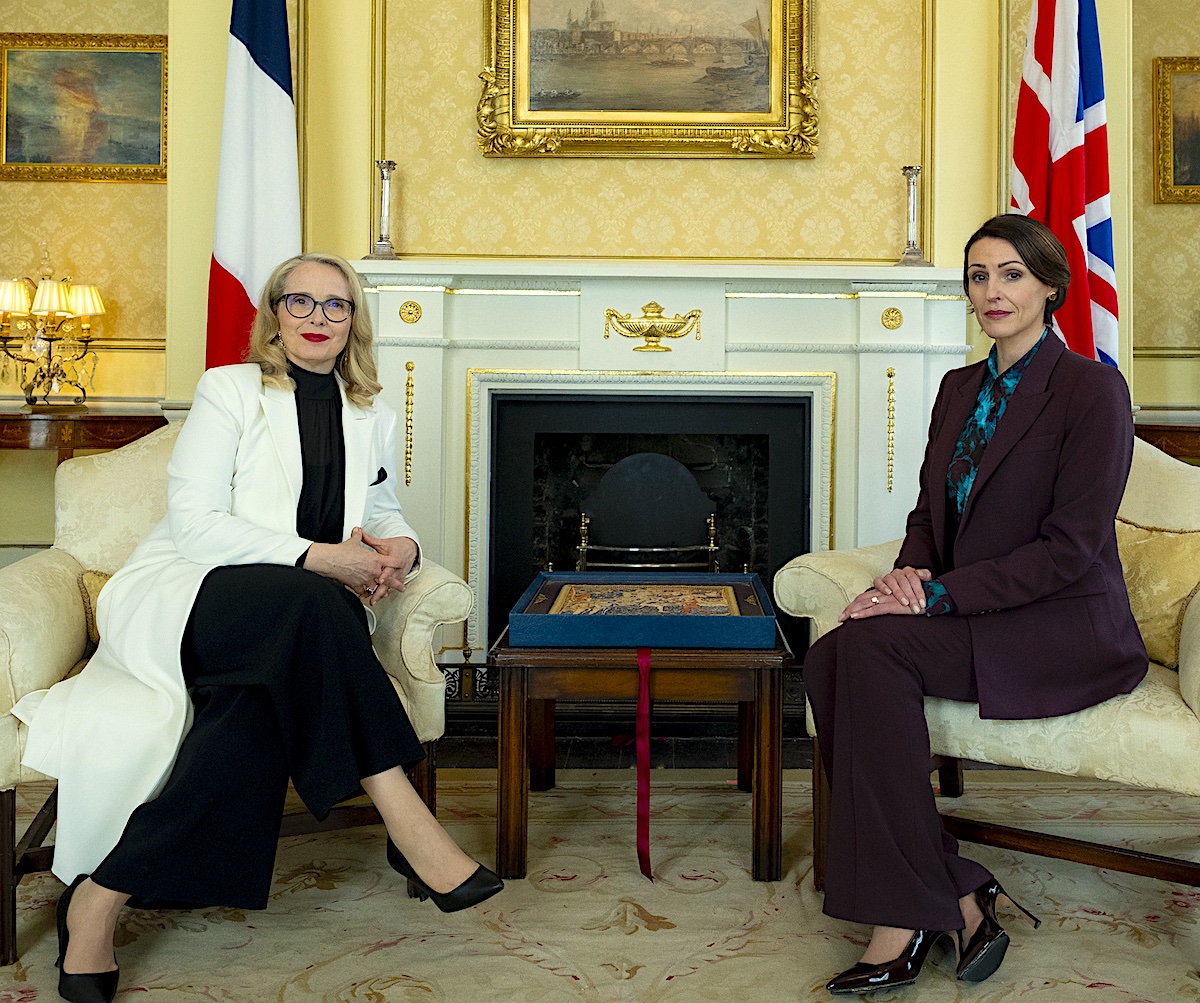theartsdesk Q&A: Suranne Jones on 'Hostage', power pants and politics | reviews, news & interviews
theartsdesk Q&A: Suranne Jones on 'Hostage', power pants and politics
theartsdesk Q&A: Suranne Jones on 'Hostage', power pants and politics
The star and producer talks about taking on the role of Prime Minister, wearing high heels and living in the public eye

If she decided to run for election, Suranne Jones would probably stand a good chance of winning. The Chadderton-born actress and producer has been a driving figure in British television ever since she became known for playing Karen McDonald on Coronation Street (2000 and 2004). Her vigorous presence and fearless nature made her a force to be reckoned with right from the start.
She was widely celebrated for her performance in Unforgiven (2009), written by Sally Wainwright, who would become a frequent collaborator. However, it was the combination of Jones's detective role in Scott & Bailey (2011-2016) followed by the gripping portrait of a GP's marriage being slowly poisoned in BBC's Doctor Foster (2015-2017) that put her at the very top of any UK TV producer's most wanted list. From Gentleman Jack to Maryland and Vigil, Jones manages to carry any show safely through even the slightest dramaturgical weaknesses (pictured below, Jones and Lesley Sharp in Scott & Bailey).
Her latest engagement is the new Netflix drama Hostage, where she plays the lead role as British Prime Minister Abigail Dalton, a woman willing to compromise to achieve her goals but not yet corrupted by power. An unwavering commitment to integrity is her greatest strength – and, ultimately, her heavy burden.
 Created in collaboration between Jones and showrunner Matt Charman, Hostage puts the British head of government in a personal crisis while having to juggle the state visit of Julie Delpy's powerful incarnation of the French president, Vivienne Toussaint. After her husband is kidnapped in French Guiana, the terrorists demand Dalton's resignation. Toussaint promises to help her but brings her own agenda and personal baggage to the story.
Created in collaboration between Jones and showrunner Matt Charman, Hostage puts the British head of government in a personal crisis while having to juggle the state visit of Julie Delpy's powerful incarnation of the French president, Vivienne Toussaint. After her husband is kidnapped in French Guiana, the terrorists demand Dalton's resignation. Toussaint promises to help her but brings her own agenda and personal baggage to the story.
Discussing over Zoom how she shaped Dalton's character, Jones talks about politics, playing alongside co-star Delpy and the importance of wearing high heels in a room full of suits and ties.
PAMELA JAHN: What do you expect from a politician?
SURANNE JONES: The question for Abigail Dalton is, how can you be truthful and a politician? How do you manage the backstage while giving as much information to the public as possible without overwhelming the nation? It's tricky, I think. Maybe rather than truth, it's something like integrity that we expect from a political leader. Every time someone gets elected, the hope is there, all those changes that we would like to see. But right now, the political climate of the world is a very strange place. Everyone's very lost, even at the top.
At first sight, Abigail Dalton is not a likeable character. What made her a woman that you could invest in?
Matt Charman and I, we developed the character together. The working title of the show was The Choice rather than Hostage. Because that's at the heart of the problem that Abigail is facing: do you choose your family or your country? We always navigated either side of the wire throughout the whole five episodes. And of course, she makes some questionable decisions. She is naive. But then there is also the uprightness that she was shown by her father, the loyalty to the party. All these different aspects of her personality and her upbringing make her the complex, conflicted character that she is.
One thing that you as an actress share with Abigail is the publicity. Was that your initial connection to the role?
 It's interesting, no matter how much TV footage of Laura Kuenssberg you watch or how many books you read or politicians you talk to, you can do all that research, but you've hit the nail on the head. Personally, I recognise, I must be careful what I say. I work long hours, I'm also away from my family a lot. Everyone knows who I am, and I have to live a certain way because my private live is of interest to the public. That was a good starting point (pictured above, Jones in Vigil).
It's interesting, no matter how much TV footage of Laura Kuenssberg you watch or how many books you read or politicians you talk to, you can do all that research, but you've hit the nail on the head. Personally, I recognise, I must be careful what I say. I work long hours, I'm also away from my family a lot. Everyone knows who I am, and I have to live a certain way because my private live is of interest to the public. That was a good starting point (pictured above, Jones in Vigil).
Julie Delpy plays the French President Vivienne Toussaint. There is a sharp contrast between the two characters, not only in their personalities but also in their appearance. How important was the costume design for you on this show?
I'm an executive producer on Hostage as well and there are so many elements to this, but we really wanted it to be an intelligent piece. We wanted it to feel authentic, right to the tiniest details. It was crucial to me that we would use British designers – a mix of high street and affordability. We never say what party Abigail is in, but I think we all know. And then Julie turns up in these colourful outfits, wearing them with such class and elegance. How does that make Abigail feel as a woman who is even younger than her? And suddenly, you see that her wardrobe is slightly improving, it's part of the process of her adapting to the circumstances that she finds herself in.
At the beginning, it almost feels like she's wearing her suits like a uniform.
They are her power pants. But what's worse, personally, I hate walking in high heels. I can't bear it. And there was a question around whether Abigail should wear them or not. In the end, we decided yes she should, because they are important to make yourself seen, to add shape and stature to oneself in a room full of suits and ties, to present your hair in a certain manner and open your eyes wider. To give yourself every chance of being listened to as a woman. Unfortunately, all that plays in, not only on screen, but in real life as well.
The setting is also relevant here. Winston Churchill once wrote that Number 10 was "shaky and lightly built". How did you feel imagining yourself in the same place?
 What fascinated me was that feeling of going from the weight of world politics upstairs or across the street to your little flat where your daughter is playing on the phone or listening to some music or being a pain in the bum. It's such a stark contrast to our tiny little lives, our day to day, when you think about the huge decisions that are being made for us by these groups of people. It's almost too mind-blowing to imagine that they have fathers, too, or that they must deal with their issues within their own lives. It's the humanity that we wanted to paint with both Abigail and Vivian. And isn't it wonderful that we had two different women in the spotlight and not just one! (pictured above, Gentleman Jack).
What fascinated me was that feeling of going from the weight of world politics upstairs or across the street to your little flat where your daughter is playing on the phone or listening to some music or being a pain in the bum. It's such a stark contrast to our tiny little lives, our day to day, when you think about the huge decisions that are being made for us by these groups of people. It's almost too mind-blowing to imagine that they have fathers, too, or that they must deal with their issues within their own lives. It's the humanity that we wanted to paint with both Abigail and Vivian. And isn't it wonderful that we had two different women in the spotlight and not just one! (pictured above, Gentleman Jack).
There is a certain choreography to the way both of your characters interact. How did you work with Julie Delpy on set?
Julie is quite an instinctive actress, always has been. She writes and directs herself, and she's worked with some brilliant filmmakers that don't necessarily always stick to what's on the page. When you meet her, she's funny and quirky and full of stories. I was excited just to be with and around her every day. We just learned the dance on the spot. I liked doing that. In the same way, Abigail and Vivienne have to find their connection on screen, and we did the same, I guess, in real time.
Why do you think people instinctively cast you as the tough cookie, rather than a broken or more vulnerable character like in the ITV series Maryland (pictured below)?
 Maryland was different. I decided to play the quieter sister. Everyone thought I was going for Eve Best's part, and I was like, no, no! I've written me as the younger sister for a reason. That was my choice. And there's also a new role coming up that is very sweet, this character smiles a lot and she's a bit daft. It's even funny for me to catch me on screen doing that. But the roles are there.
Maryland was different. I decided to play the quieter sister. Everyone thought I was going for Eve Best's part, and I was like, no, no! I've written me as the younger sister for a reason. That was my choice. And there's also a new role coming up that is very sweet, this character smiles a lot and she's a bit daft. It's even funny for me to catch me on screen doing that. But the roles are there.
Would you say that you've always been more of a fighter yourself?
I definitely wasn't when I was younger. I was quite shy and quiet. Even today, I really enjoy my own company. Sometimes I don't really know why I'm attracted to those strong characters when it actually takes so much out of me. I'm probably an introverted extrovert. I love what I do, but I'm also someone who needs time to reset. I'm having the summer off with my little boy, and I can't wait to just play with him and take him to the beach.
What’s the attraction for you to make TV shows over film?
It would be lovely and easier to invest in a character that took just five or six weeks to shoot based on a two-hour script. Right? I know that, especially now, since I develop new shows myself. But I feel like in a series you can delve more into the complexities of the situation or the drama at hand. People can ride the characters with you, and you can rejoin them at a different point if you go to a second or third series. It's kind of been my life for 27 years. I love British TV, and I'm so grateful for the careers that I've had the chance to portray. Now, I'm finding new talent myself. My husband and I run a production company, and I feel like I'm giving back. It's cyclical. That said, it would also be nice at some point if I could leave some space for a film.
Hostage comes at a time where the current UK government has been in charge for a year and a lot of the country's foreign politics relies on the relationship between Britain and France. Did you have any trepidation to touch on these issues?
 I thought a lot about that. It's such an interesting time to have a political drama, especially with two women at the centre of it. Here and in America, this will go out everywhere. That's fascinating and it's intriguing. Hopefully people will tune in just to see what the alternatives look like, even if it's fictional, because we're all looking for answers right now.
I thought a lot about that. It's such an interesting time to have a political drama, especially with two women at the centre of it. Here and in America, this will go out everywhere. That's fascinating and it's intriguing. Hopefully people will tune in just to see what the alternatives look like, even if it's fictional, because we're all looking for answers right now.
What this show brings to the forefront once again is the status quo of toxic masculinity in our society. Almost none of the men around Abigail and Vivienne, at least in Number 10, come across as supportive.
Yeah, there are not many hopeful men around her in her cabinet. But the focus here is on the women (Delpy and Jones pictured above). Toxic masculinity is there, it's everywhere. Sadly, I don't think it's going away.
The future of Arts Journalism
You can stop theartsdesk.com closing!
We urgently need financing to survive. Our fundraising drive has thus far raised £49,000 but we need to reach £100,000 or we will be forced to close. Please contribute here: https://gofund.me/c3f6033d
And if you can forward this information to anyone who might assist, we’d be grateful.

Subscribe to theartsdesk.com
Thank you for continuing to read our work on theartsdesk.com. For unlimited access to every article in its entirety, including our archive of more than 15,000 pieces, we're asking for £5 per month or £40 per year. We feel it's a very good deal, and hope you do too.
To take a subscription now simply click here.
And if you're looking for that extra gift for a friend or family member, why not treat them to a theartsdesk.com gift subscription?
more TV
 theartsdesk Q&A: Suranne Jones on 'Hostage', power pants and politics
The star and producer talks about taking on the role of Prime Minister, wearing high heels and living in the public eye
theartsdesk Q&A: Suranne Jones on 'Hostage', power pants and politics
The star and producer talks about taking on the role of Prime Minister, wearing high heels and living in the public eye
 King & Conqueror, BBC One review - not many kicks in 1066
Turgid medieval drama leaves viewers in the dark
King & Conqueror, BBC One review - not many kicks in 1066
Turgid medieval drama leaves viewers in the dark
 Hostage, Netflix review - entente not-too-cordiale
Suranne Jones and Julie Delpy cross swords in confused political drama
Hostage, Netflix review - entente not-too-cordiale
Suranne Jones and Julie Delpy cross swords in confused political drama
 In Flight, Channel 4 review - drugs, thugs and Bulgarian gangsters
Katherine Kelly's flight attendant is battling a sea of troubles
In Flight, Channel 4 review - drugs, thugs and Bulgarian gangsters
Katherine Kelly's flight attendant is battling a sea of troubles
 Alien: Earth, Disney+ review - was this interstellar journey really necessary?
Noah Hawley's lavish sci-fi series brings Ridley Scott's monster back home
Alien: Earth, Disney+ review - was this interstellar journey really necessary?
Noah Hawley's lavish sci-fi series brings Ridley Scott's monster back home
 The Count of Monte Cristo, U&Drama review - silly telly for the silly season
Umpteenth incarnation of the Alexandre Dumas novel is no better than it should be
The Count of Monte Cristo, U&Drama review - silly telly for the silly season
Umpteenth incarnation of the Alexandre Dumas novel is no better than it should be
 The Narrow Road to the Deep North, BBC One review - love, death and hell on the Burma railway
Richard Flanagan's prize-winning novel becomes a gruelling TV series
The Narrow Road to the Deep North, BBC One review - love, death and hell on the Burma railway
Richard Flanagan's prize-winning novel becomes a gruelling TV series
 The Waterfront, Netflix review - fish, drugs and rock'n'roll
Kevin Williamson's Carolinas crime saga makes addictive viewing
The Waterfront, Netflix review - fish, drugs and rock'n'roll
Kevin Williamson's Carolinas crime saga makes addictive viewing
 theartsdesk Q&A: writer and actor Mark Gatiss on 'Bookish'
The multi-talented performer ponders storytelling, crime and retiring to run a bookshop
theartsdesk Q&A: writer and actor Mark Gatiss on 'Bookish'
The multi-talented performer ponders storytelling, crime and retiring to run a bookshop
 Ballard, Prime Video review - there's something rotten in the LAPD
Persuasive dramatisation of Michael Connelly's female detective
Ballard, Prime Video review - there's something rotten in the LAPD
Persuasive dramatisation of Michael Connelly's female detective
 Bookish, U&Alibi review - sleuthing and skulduggery in a bomb-battered London
Mark Gatiss's crime drama mixes period atmosphere with crafty clues
Bookish, U&Alibi review - sleuthing and skulduggery in a bomb-battered London
Mark Gatiss's crime drama mixes period atmosphere with crafty clues
 Too Much, Netflix - a romcom that's oversexed, and over here
Lena Dunham's new series presents an England it's often hard to recognise
Too Much, Netflix - a romcom that's oversexed, and over here
Lena Dunham's new series presents an England it's often hard to recognise

Add comment